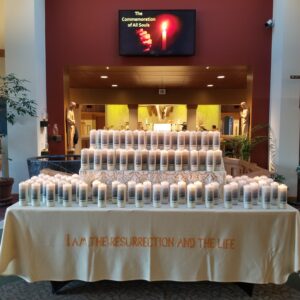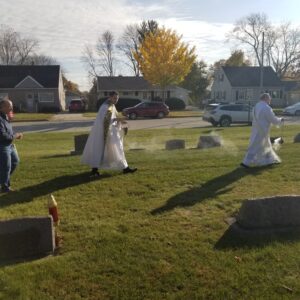Hope Does Not Disappoint
The Commemoration Mass of All the Faithful Departed
November 2, 2024




“As we enter Heaven, we will see them, so many of them, coming towards us and thanking us.
We will ask who they are, and they will say ‘a poor soul you prayed for in purgatory.’” – Ven. Fulton Sheen
The month of November is dedicated to the Holy Souls in Purgatory. The Church commemorates all her faithful children who have departed from this life, but have not yet attained the joys of heaven. St. Paul warns us that we must not be ignorant concerning the dead, nor sorrowful, “even as others who have no hope … For the Lord Himself shall come down from heaven … and the dead who are in Christ shall rise.
The Church has always taught us to pray for those who have gone into eternity. Even in the Old Testament prayers and alms were offered for the souls of the dead by those who thought “well and religiously concerning the resurrection.” It was believed that “they who had fallen asleep with godliness had great grace laid up for them” and that “it is therefore a holy and wholesome thought to pray for the dead, that they may be loosed from sins.” We know that a defiled soul cannot enter into heaven.
Fr. Tim Schumaker
Pastoral Pondering
This past weekend we celebrated All Soul’s Day. It is a day where we remember and pray for those who have died, especially our family and friends. While praying for the dead has long been found in the tradition of the Church, recent times suggest we may have fallen out of practice of this beautiful and necessary act of charity. It is a strange thing to do, to pray for the dead. After all, what are we actually praying for the dead to obtain? The answer to this is based on the reality of Purgatory. Purgatory, another tradition that we do not speak much of today, is real. But what exactly is it? To understand this we need to be aware that purgatory is not necessarily a place but a process. Even here on earth, we are called to live a life of purgatory. The word purgatory means to purify, or in other words, to achieve the holiness necessary to enter heaven. Purgatory is a process which prepares us for heaven. When understood this way, purgatory is not just something for those who have died, but for all us living as well. All of us can be striving to prepare ourselves for heaven. However, as we know in our own life, we do not always take advantage of the time afforded to us here on earth. In fact, I can spend very little time preparing for heaven and rather spend a lot of time preparing for life on earth. To account for this, God gives us additional time after we die so that we can “make up” the time we may have wasted on earth. That’s a pretty good deal; that God gives us even more time to prepare for heaven if we need it. That said, we may be tempted to ask why do we need to prepare for heaven at all? My favorite way of explaining this is with a sports analogy. For those of us who played sports, we quickly become aware of how we compare to our teammates and opponents. For example, I did not play basketball until I entered into seminary. Many of the seminarians had played basketball for many years. I quickly became aware of how poorly I played basketball compared to these men. I felt like I did not belong. However, since I did not want to be the weak link and hurt my team, I devoted additional time to learn the game and increase my skill. While I never was the star on the team, I no longer felt like I was holding the team back. The relationship between heaven and purgatory is similar. If I were to die right now and go straight to heaven, I would immediately feel as if I do not belong because there are many things I am still attached to here on earth. Even if I am free from sin, there are still sins I have the desire to commit. I would feel as if I was the “weak link” as I stood among all the saints who completely entrusted their life to God. If we are honest, we know that even our loved ones who have died were not perfect. To account for this, God gives us the training ground, the process of purgatory. Purgatory prepares us for a spot on the team, the team of heaven. When we pray for the dead, we are praying that this process may go quick. That they may “practice”, purify, prepare, themselves for heaven as fast as possible. We are acting as cheerleaders in a way, encouraging and helping them. When thought of in this way, purgatory does not seem all that bad or scary, in fact it is a great thing for it allows us to experience the full joy of heaven.
Duration of Purgatory
Purgatory is not eternal. Its duration varies according at each particular judgment. But the end of the world, which will be also the end of time, will close for ever the place of temporary expiation. God will know how to reconcile His justice and His goodness in the purification of the last members of the human race, and to supply by the intensity of the expiatory suffering what may be wanting in duration. But, whereas a favourable sentence at the particular judgment admits of eternal beatitude being suspended and postponed, and leaves the bodies of the elect to the same fate as those of the reprobate; at the universal judgment, every sentence, whether for heaven or for hell, will be absolute, and will be executed immediately and completely.
Resource Catholic Culture
Offering Prayers and Sacrifices
The Church Suffering and the Church Militant constitute in their relations a second circle of most vital activities. Having entered into the night “wherein no man can work,” the Suffering Church cannot ripen to its final blessedness by any efforts of its own, but only through the help of others—through the intercessory prayers and sacrifices (suffragia) of those living members of the Body of Christ who being still in this world are able in the grace of Christ to perform expiatory works. The Church has from the earliest times faithfully guarded the words of Scripture that it is a holy and a wholesome thing to pray for the dead that they may be loosed from their sins. [2 Macab. 12, 43] The suppliant cry of her liturgy: “Eternal rest give to them, O Lord, and let perpetual light shine upon them,” can be heard already in the Acts of the martyrdom of SS. Perpetua and Felicitas (A.D. 203) and is represented in numerous sepulchral inscriptions of the most ancient period, while theologians and Fathers of the Church, beginning with Tertullian, have supplied its substantial proof. . . . So fundamental indeed and so natural to man’s hope and desire and love is this belief, that historians of religion have discovered it among almost all non-Christian civilized peoples: a striking illustration of Tertullian’s saying that the human soul is naturally Christian.
The Catholic, therefore, is jealous to expiate and suffer for the “poor souls,” especially by offering the Eucharistic Sacrifice, wherein Christ’s infinite expiation on the Cross is sacramentally represented, and stimulating and joining itself with the expiatory works of the faithful, passes to the Church Suffering according to the measure determined by God’s wisdom and mercy.
— Karl Adam
Resource Catholic Culture
Eternal rest grant to them, O Lord, and let perpetual light shine upon them. May the souls of the faithful departed, through the mercy of God, rest in peace. Amen.